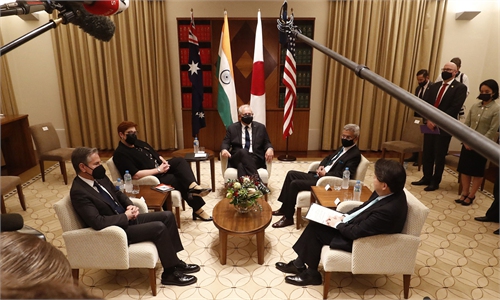S.Korea should be wary of becoming another Quad chess piece

Political chocies Illustration: Liu Rui/GT
The Quadrilateral Strategic Dialogue (Quad) has come into being for a while. Its member countries - the US, Japan, Australia and India - have been stepping up their efforts to turn this multilateral dialogue into a full-fledged mechanism. In the past years, the member countries have set up working groups to explore their cooperation in the fields of vaccines, tech and climate change; the virtual and in-person summits were held last year; based on a division of labor, the four countries agreed to jointly deliver up to 1 billion doses to ASEAN by the end of 2022, even though the commitment may not be fulfilled on time as they can only roll out the first batch of COVID vaccines in the first half of this year.Since its official debut in May 2007, the Quad met strong suspicion from China, which did not feel comfortable with this exclusive security-oriented group. After a 10-year hiatus, the Quad was finally activated in November 2017, right before the Trump administration designated China as a revisionist country in the Indo-Pacific region. Naturally, China registered its opposition. In order to contain China, the Trump administration adopted the Indo-Pacific Strategy, in which the Quad has played a critical role in bringing together four countries that all had issues with China.
Certainly, the US government has a strong motive to pull South Korea into this dialogue. Unfortunately, South Korea's initial attitude was lukewarm, if not evasive. The reasons are simple and plain. First, Moon Jae-in just came to power then. He wanted to recover Seoul-Beijing relations damaged by the THAAD dispute. Moon had no intention to join the Quad to further hurt the bilateral relations. Second, as the China-US strategic rivalry heated up, South Korea had no desire to side with the US by joining the Quad and alienate China. Moon had tried hard to strike a delicate balance in South Korea's relations with both China and the US. Third, the inter-Korean relations just entered an entente after experiencing an unprecedented crisis that had pushed the Korean Peninsula to the brink of war. South Korea needed China's support and cooperation in pursuing the denuclearization of the Korean Peninsula. Fourth, South Korea's ties with Japan soured and quickly plunged to a historical low after the Moon administration abrogated the 2016 comfort women agreement signed between Seoul and Tokyo. Japan was not in a mood to pull South Korea into the Quad.
Nonetheless, as the COVID-19 pandemic raged across the world, the South Korean government has softened its attitude toward the Quad and agreed to cooperate with the Quad on a case-by-case basis. On March 20, 2020, for the first time, with Vietnam and New Zealand, South Korea joined the Quad's meeting with an aim to forge a joint response to the pandemic, thus, the Quad was transformed into the "Quad Plus."
Since Joe Biden came to power, the US government adopted a two-pronged policy in its strategic rivalry with China on the Korean Peninsula: To rally its allies' support by mending the fence with South Korea; to enhance the Quad and pull South Korea into it. The Biden administration swiftly settled a dispute with South Korea over the burden-sharing for the US forces stationed in South Korea, pulled South Korea into the Quad Plus meetings, thus making the cooperation between South Korea and the Quad a fait accompli, and elevated South Korea's international standing by inviting Moon to attend G7 meetings. At the same time, the US government quickly upgraded Quad from a ministerial-level multilateral dialogue to a summit-level one and expanded Quad's scope of non-security cooperation.
In the era of Yoon Seok-youl, the South Korean president-elect, it is possible for South Korea to join the Quad. In his presidential campaign, Yoon once said that South Korea will participate in the working groups on vaccines, climate change, and new technology in a phase-in fashion.
As a sovereign country, South Korea enjoys autonomy to make its own decision to join any organization, but it should do so by taking into consideration its biggest neighbor and largest economic partner China. President-elect Yoon always emphasizes that Seoul-Beijing relations "should be grounded in respect for each other's interests and policy positions." China respects South Korea's cooperation with other countries or organizations, but such cooperation should not be achieved at the expense of China's national interest.
As China values the hard-earned normalized relations with South Korea and seeks to cooperate with the Yoon administration in the future, China has a high expectation of South Korea to return in kind, refraining from becoming a formal member of the Quad, widely perceived by the Chinese as an "anti-China security arrangement." Even India, a formal Quad member, is wary of being made use of in Washington's strategic calculations for the Indo-Pacific region. Former US deputy secretary of state Richard Armitage said in December 2021 that it would be almost foolish for "the Republic of Korea to even think that they want to join the four nations - Australia, India, Japan and the US."
The author is a professor with the School of International Studies, Renmin University of China, and a senior researcher of the Pangoal Institute. opinion@globaltimes.com.cn


